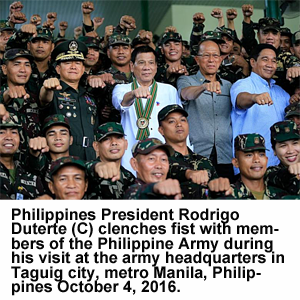 MANILA/WASHINGTON (By Martin Petty and David Brunnstrom Reuters) – U.S. President-elect Donald Trump invited Philippines leader Rodrigo Duterte to the White House next year during a “very engaging, animated” phone conversation, a Duterte aide said on Friday, amid rocky relations between their two countries.
MANILA/WASHINGTON (By Martin Petty and David Brunnstrom Reuters) – U.S. President-elect Donald Trump invited Philippines leader Rodrigo Duterte to the White House next year during a “very engaging, animated” phone conversation, a Duterte aide said on Friday, amid rocky relations between their two countries.
Trump’s brief chat with the firebrand Philippine president comes during a period of uncertainty about one of Washington’s most important Asian alliances, stoked by Duterte’s unrelenting hostility toward the United States and his repeated threats to sever decades-old defense ties.
The call lasted just over seven minutes, Duterte’s special advisor, Christopher Go, said in a short text message to media, which gave few details. Trump’s transition team had no immediate comment.
In his five months in office, the volatile Duterte has upended Philippine foreign policy by berating the United States, making overtures toward historic rival China and pursuing a new alliance with Russia.
His diplomacy has created jitters among some Asian countries, wary about Beijing’s rising influence and Washington’s staying power as a regional counterbalance.
The maverick former mayor has praised China and told U.S. President Barack Obama to “go to hell” and called him a “son of a bitch” whom he would humiliate if he visited the Philippines.
The anger was unleashed after Obama expressed concern about possible human rights abuses in Duterte’s war on drugs, during which over 2,000 people have been killed.
Duterte had initially expressed optimism about having Trump in the Oval Office, saying he no longer wanted quarrels. But it has not tempered his rhetoric and he has continued to rail at what he calls U.S. “hypocrisy” and “bullying”.
In an interview with Reuters during the election campaign, Trump said Duterte’s comments showed “a lack of respect for our country”.
Sometimes referred to as the “Trump of the East” because of his mercurial ways, Duterte has threatened repeatedly to sever defense ties between the two allies, saying he “hates” having foreign soldiers in his country.
Joint military exercises look set to be scaled back next year, as Duterte demanded, including the number of U.S. troops involved.
‘CLEAN SLATE’
A question mark hangs over the future of a 2014 Enhanced Defence Cooperation Agreement (EDCA), however, a deal of strategic importance to Washington because it allows U.S. forces access to Philippine bases on a troop rotation basis.
A source who has advised Trump’s transition team on security policy told Reuters last week that Trump would start a “clean slate” with the Philippines.
“He is perfectly capable of talking to Duterte in an open way without being wedded to previous policy failures,” the source said of Trump.
“But EDCA is a concern and some of the things Duterte has said are a concern. That is not going to change based on who the president is.”
Duterte caused a stir when he visited China in October and announced his “separation” from the United States. He has said Washington could not be trusted to support the Philippines if it were attacked, as mandated in a joint defense treaty.
In an article in Foreign Policy magazine before the U.S. election, Trump campaign advisers Peter Navarro and Alex Gray blamed the bilateral breakdown on the Obama administration’s failure to intervene in 2012 when China seized the Scarborough Shoal in the South China Sea, which the Philippines considers its fishing ground.
“Washington’s utter failure to uphold its obligations to a longtime, pivotal ally during one of its most humiliating crises has no doubt contributed to Philippine President Rodrigo Duterte’s low opinion of American security guarantees — and his recent move toward a China alliance,” they wrote.
Some experts, however, say Duterte’s appointment of special envoys to Washington suggest that despite his hostility, he intends to keep good ties.
Among those envoys is multi-millionaire real estate tycoon Jose Antonio, who bought the rights to name a new office tower in Manila “Trump Towers”.
His political envoy is Babe Romualdez, a Filipino columnist who on Thursday said his job may include explaining to the U.S. government and legislators what Duterte’s perplexing pronouncements mean.
“President Duterte may say it, but to actually do it is something else,” Romualdez told news channel ANC.
(Reporting by Manuel Mogato in MANILA and Steve Holland in WASHINGTON; Writing by Martin Petty; Editing by Mark Trevelyan)